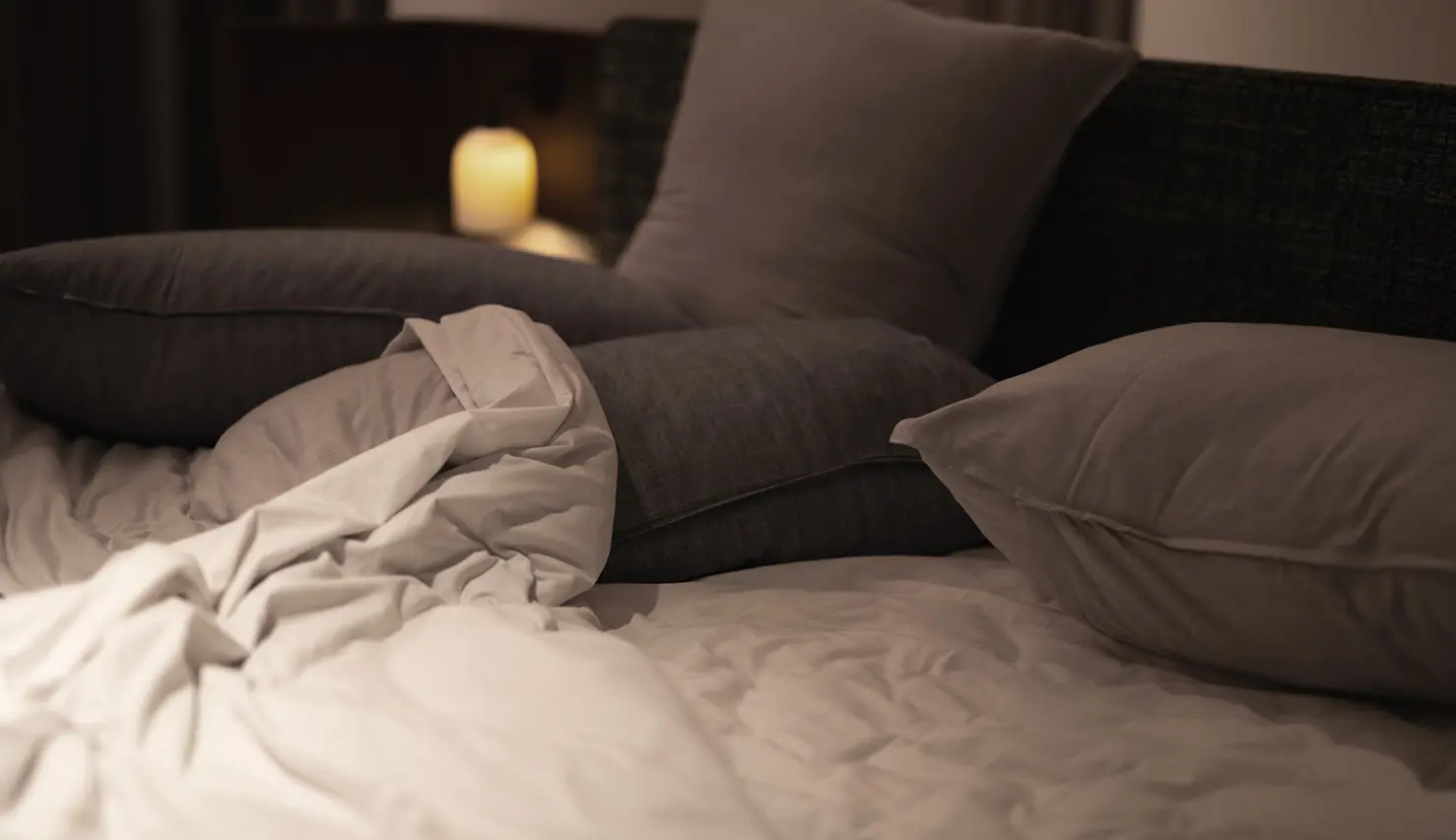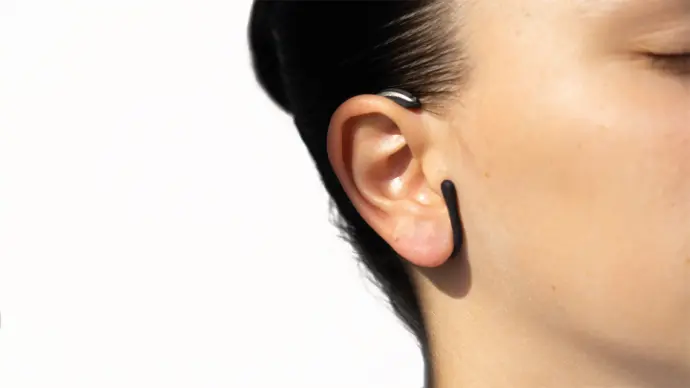Tinnitus and sleep disorders:
tips for a better night's sleep
Tinnitus is more than just a constant noise in the ears – especially at night, it can significantly disrupt sleep. In this article, we’ll show you why that is, what you can actively do about it, and how modern treatment methods can help.
Why tinnitus affects sleep
Tinnitus is often perceived as particularly loud in a quiet bedroom – and that can make falling asleep a real challenge.
Those who suffer from tinnitus know the feeling: during the day, background noise provides distraction, but at night the whistling, humming, or ringing in the ears becomes an unpleasant focal point. Studies show that people with tinnitus are more likely than average to experience difficulties falling asleep and staying asleep.
Typical effects on sleep:
- Difficulty falling asleep due to inner restlessness and perception of noise
- Frequent waking during the night
- Difficulty falling back asleep
- Lack of deep sleep phases
First aid for sleep disorders caused by tinnitus
If tinnitus is keeping you from sleeping, simple yet targeted measures can often help. In this section, we’ll show you how to optimize your nighttime environment and improve the conditions for falling asleep.
Tinnitus is perceived more intensely at night because external sources of noise are absent. That makes it all the more important to actively counteract it. The goal: to calm your body, integrate the ear noise, and create a sleep-promoting environment.
What you can do yourself
Many practical tips can be easily integrated into everyday life – and can significantly improve your sleep quality, even if tinnitus is particularly noticeable at night.

Use gentle background sounds
A soft noise (white noise), nature sounds, or calm music can help “mask” the ear noise, meaning they can cover it up. Pleasant sounds and music have been proven to have a relaxing effect and can make it easier to fall asleep.

Establish regular sleep times
Our sleep-wake cycle is sensitive. Try to go to bed and get up at the same time every day – even on weekends. This helps “program” your body and supports good sleep and recovery for both body and mind.

Introduce evening rituals
Routines signal to the body that it’s time to wind down. This could be a short walk, a cup of herbal tea, or a warm shower.

Reduce screen time
Avoid using your phone, tablet, or laptop for at least an hour before going to bed. The blue light from these devices inhibits the production of melatonin – the hormone that makes you feel sleepy.

Avoid alcohol and caffeine
Both substances have a stimulating effect and can intensify the perception of tinnitus – especially when consumed in the evening.

Create an optimal sleep environment
Darkness, fresh air, and a comfortable room temperature (around 18 degrees Celsius) are essential for a good night's sleep.

Exercise and physical activity
Engage in regular physical activity in daylight or moderate exercise. This reduces stress in the body and promotes the production of melatonin, the sleep hormone, in the evening.

Relaxation exercises
Many people with tinnitus suffer from deep tension in the jaw, neck, and shoulder area. Targeted exercises can help release this tension permanently.
Small measures – big impact
Sometimes even a small change is enough to make a noticeable difference. What’s important: if you try something new, stick with it for 2–3 weeks. That’s how long it takes to establish a good routine and for your body to adapt.

TIP:
The ForgTin®Pro app offers many soothing sounds for relaxation and distraction, as well as targeted exercises for people with tinnitus to relieve tension – with a positive effect on ear noise and sleep quality.
How stress worsens sleep
Stress is one of the main amplifiers of tinnitus. At the same time, poor sleep leads to increased stress – a vicious cycle that is difficult to break without targeted countermeasures.
Tinnitus und Stress!
Read why stress has such a strong impact on ear noise and which physical processes are involved.
Effective strategies for tinnitus-related sleep problems
Targeted techniques can help reduce internal stress – and with it, the negative impact of tinnitus on your sleep quality.
Mindfulness training and meditation
Simple mindfulness exercises help consciously shift attention away from disturbing thoughts or sounds. This promotes emotional distance not only from the tinnitus itself but also from issues, worries, and pain in everyday life.
Journaling
Writing down thoughts, worries, or to-do lists before going to bed creates mental clarity and relieves the mind.
Progressive muscle relaxation
This technique has been proven to reduce stress levels and make it easier to fall asleep – especially effective when combined with breathing exercises.
Psychological support or therapy
Cognitive behavioral therapy can help break negative thought patterns related to tinnitus and develop new coping strategies.
Tinnitus-specific cognitive behavioral therapy (CBT)
Studies show that CBT is particularly effective in reducing the distress caused by tinnitus, influencing the perceived loudness of the tinnitus – and improving sleep quality.
TIP:
Acceptance instead of resistance
The more you try to “fight” tinnitus, the stronger it can seem. In mindfulness-based stress reduction (MBSR), individuals learn to find a new way of dealing with pain, ear noises, and negative issues in life. This can also be very helpful for tinnitus and is often the first step toward greater calm and better sleep.
MBSR is easy to learn – through courses, training programs, digitally or in person.
Living with tinnitus: strategies for everyday life
Read more practical everyday strategies in our comprehensive article on living with tinnitus.
Modern treatment methods for tinnitus and sleep disorders
Modern treatments for tinnitus, stress, and sleep disorders focus on a combination of neurostimulation, targeted active exercises, relaxation, and behavioral changes.
ForgTin®: Gentle pressure stimulation and app support
Pansatori has harnessed the benefits of acupressure specifically for people with tinnitus – with the innovative product ForgTin. The ear clips gently stimulate key areas of the ear, helping to sustainably reduce stress and its effects, as well as jaw, shoulder, and neck tension that can trigger tinnitus.
Conclusion:
Better sleep despite tinnitus – it is possible!
Tinnitus doesn’t have to lead to sleepless nights – with the right strategy, you can find your way back to restful sleep.
